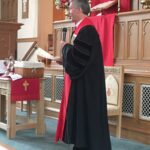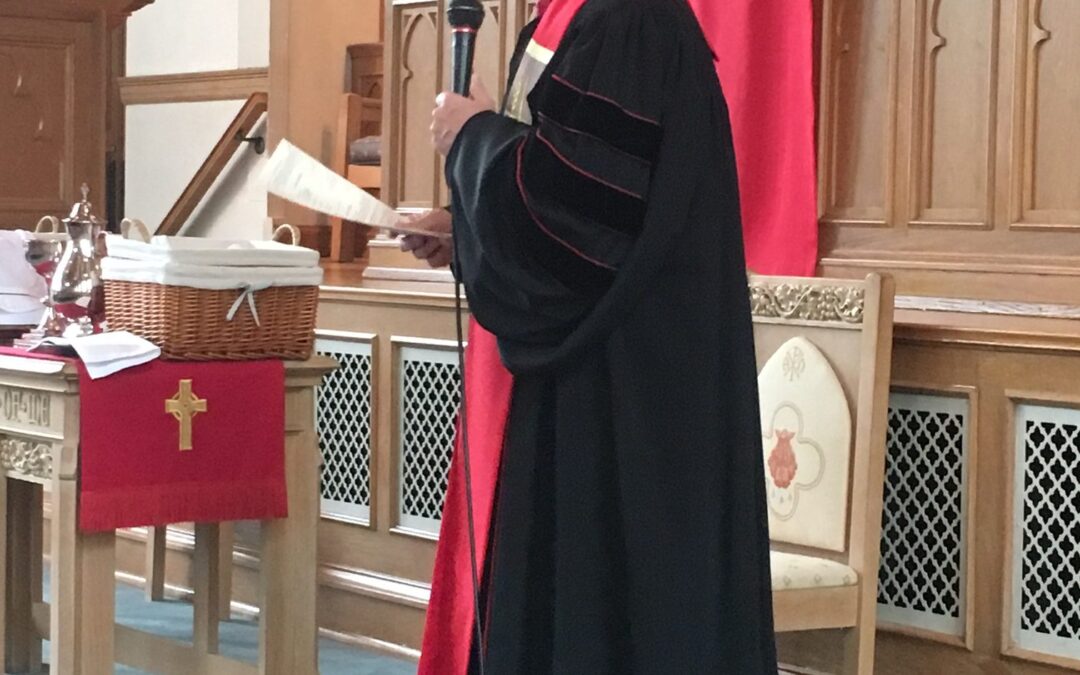 The Sunday morning gathering of the people for the proclamation of the Word of God,
The Sunday morning gathering of the people for the proclamation of the Word of God,
for the breaking of bread and prayers, is the primal function of the church.
Strip everything else away – the buildings and bulletins,
the pews and the paraments, the committees and the councils,
the choirs and candles, the youth retreats and staff meetings,
the operating budgets and capital campaigns…
if all these were to disappear, we would still be the Church.
The church is not the buildings.
The church is not the clergy or the session.
The church is not about a particular family, or party, or nation.
The church is the gathering of the people around the Word for the breaking of bread and prayers.
The church exists, first and foremost, for the worship and praise of God.
In Acts 2, the eleven disciples had gathered on a Sunday morning in Jerusalem,
50 days after the first Easter. Seven weeks after the resurrection, they were gathered,
waiting on the Spirit, as Jesus had instructed them to do.
Suddenly, there a rush of a violent wind.
Something like tongues of fire rested upon each of them.
The Holy Spirit filled them, and enabled them to speak the Word of God in other languages.
Thousands of Jewish faithful who had come to Jerusalem from all over the Mediterranean basin
for the harvest festival heard the eleven speaking in their own languages.
Amazed and perplexed, they wondered what this might mean.
Peter stood up, raised his voice, and addressed the crowd.
He quoted the Old Testament prophecy of Joel. He quoted the psalms of David.
He spoke of the life, death, and resurrection of Jesus,
and proclaimed Jesus of Nazareth as Lord and Christ, the Promised Messiah who had come.
The crowds responded. They were “cut to the heart”. They asked what they should do.
“Repent and be baptized, every one of you”, Peter replied.
That day, on the birthday of the Church, thousands were added to their number.
From that day on, the forgiven faithful have devoted themselves to worship –
to the apostles teaching and fellowship, to the breaking of bread and prayers.
From that day on, lives have been transformed as members of the church
have sold their possessions and goods, pooled their resources,
supported the worship of the church, and given to anyone among them in need.
From that day on, throughout the world,
followers of Jesus have shared their homes and their hearts.
They have praised God and found the favor of all the people.
And from that day on, every day the Lord has added to the number of those who are being saved.
How appropriate it is that our session has proclaimed this day as Alan Kenton Sunday!
Most of you are probably aware of Alan’s tireless work on behalf of this congregation,
on behalf of the Lord adding to our number those who are being saved.
Alan has told me, on several occasions, that his persistent work in welcoming people to the congregation
is based in his own experience of being welcomed by God and others.
Alan Kenton has meant the world to this church and its mission.
But Alan will tell you, that this church has meant the world to him and his family.
The church of Jesus Christ, the church into which Alan Kenton has welcomed countless souls,
was born that day, long ago, as the people gathered together,
as they waited upon the Spirit, as they responded to the Spirit’s call.
The church continues to be sustained today as the people gather, as we wait together for the Spirit,
as we respond to the Spirit’s call.
The focus of our gathered community, from the first day until now, is Jesus the Christ,
the Messiah, the Savior, the embodied Word of God who came to save.
Peter’s sermon on that first day of the Church about Jesus was provocative;
it called for a response to Jesus. As Will Willimon said, Peter’s sermon was
“profoundly unsettling and deeply threatening to the crowd in the street;
their first attempt at explaining or rationalizing what was happening was to call it inebriation.”
They are filled with new wine!, the crowd sneered.
Anytime the Word of God is publicly proclaimed, anytime the message of Jesus is shared,
we can expect questions to be evoked. We can anticipate perplexity and bewilderment.
We can even expect some measure of scorn and derision.
The Word of God will no doubt comfort the afflicted, but it will also afflict the comfortable.
The worship of Jesus Christ will always calls for some decision,
some response from those who take the message to heart.
The work of the church is not mere speech to be heard, or doctrine to be memorized,
or music to be appreciated, but worship at its heart is an event, a happening,
that demands our response.
Something happens in worship, if we are open to the Spirit.
What the church proclaims from week to week in word and song,
what the fellowship and prayers accomplish from week to week,
what the breaking of the bread together engenders,
helps determine the world in which we live.
In the worship of Jesus Christ, we act out a new reality.
Current reality gives way to a new situation in Jesus Christ, if we are open to the Spirit.
The event which occurred in Jerusalem so many years ago still has consequences
for our individual lives and for the world.
The crucifixion and resurrection of Jesus Christ entails consequences for the world, for you and for me.
As Peter proclaimed 2000 years ago, and as we have seen throughout history,
this news of this event and the response of the people to this event
will continue slowly taking over the world as we know it.
The front line and vibrant growth of the Church has moved from continent to continent over time –
from Jerusalem to the Mediterranean basin, into Europe and the British Isles,
throughout North and Central America, and now vibrant in southeast Asia and sub-Saharan Africa.
Though on decline in some places, the Church is alive and well and growing,
particularly in the southern hemisphere.
As Peter proclaimed, “This promise of Jesus is for you, for your children, for all who are far away,
for all whom the Lord our God will call.”
One of the unexpected winds of the Spirit of this renovation process
has been the old wooden chairs and tables. The Norvisi Fellowship,
which meets in our chapel every Sunday afternoon,
has loaded literally hundreds of old chairs and a number of the old wooden tables into a truck.
They will transfer these into a shipping carton to send to the growing churches of Ghana,
where thousands are baptized every year into the Christian faith.
I cannot think of a better use for those indestructible old wooden tables and chairs!
Peter’s sermon set the people of Jerusalem on a different course.
Those who had traveled to the Holy City for a harvest festival
went home with the fruit of the Holy One within them.
No longer would the presence and work of God be far away, limited by geography or ethnicity.
The presence and work of God in Jesus Christ would be with them wherever they went.
They would take the message of Jesus wherever they went,
and the gathering of the faithful, the receiving of unexpected winds of the Spirit,
would spread the Church throughout the world.
Each time we gather in fellowship, each time we wait for unexpected winds of the Spirit,
each time we break bread at the table, and offer prayers for the world,
we re-enact that first day of the Church.
As much as things have changed over the centuries, some things remain the same.
For all those who hear God’s Word, the same questions remain,
“What does this mean? and What shall we do?”
What does the message of Jesus Christ mean for your life?
How shall we respond to the life, death, and resurrection of Jesus?
Will we repent and seek forgiveness once again?
Will we devote ourselves to the apostles teaching and fellowship,
to the breaking of bread and prayers?
Will we know the awe and wonder of those first Christians,
who witnessed wonders and miraculous signs?
Will we come together in mission, to sell possessions and share our goods?
Will we share our hearts and our homes, praising God and enjoying the favor of all the people?
If we wait on the Spirit and respond to God’s call,
then surely the Lord will add daily to our number those who are being saved.
On this birthday of the Church, let us recommit to our primal function –
to gathering together for worship and praise, for the breaking of bread and prayers.
The salvation of the world, or at least the little worlds in which we live, just may depend upon it.
To God be all glory, honor and power. Amen.
Rev. Dr. Todd Speed
Decatur Presbyterian Church
Decatur, Georgia
June 4, 2017


